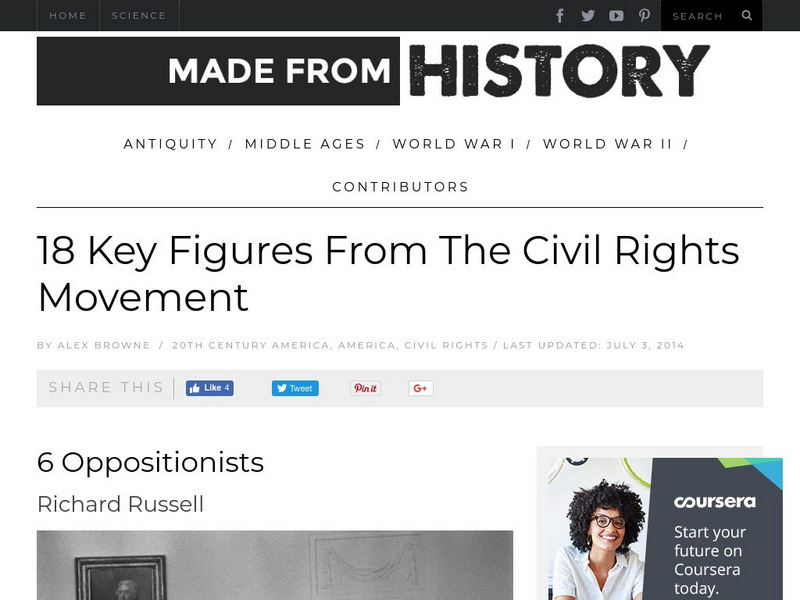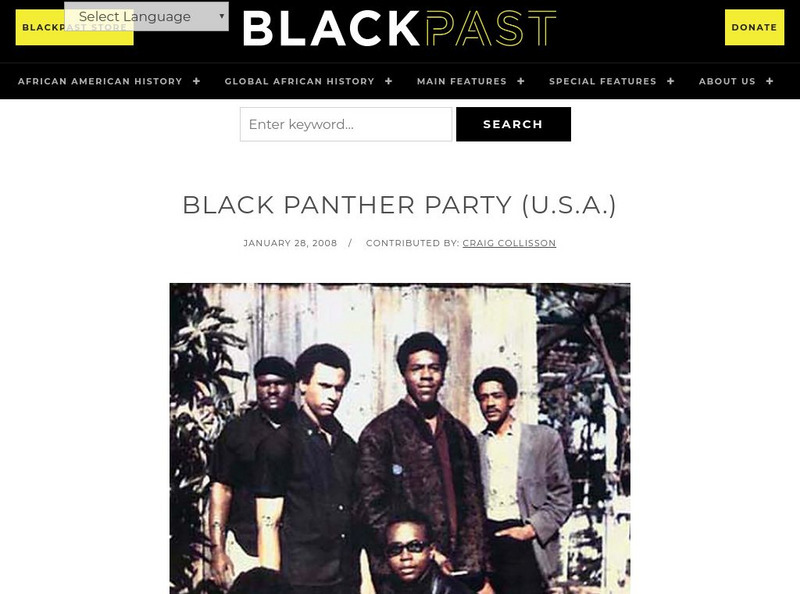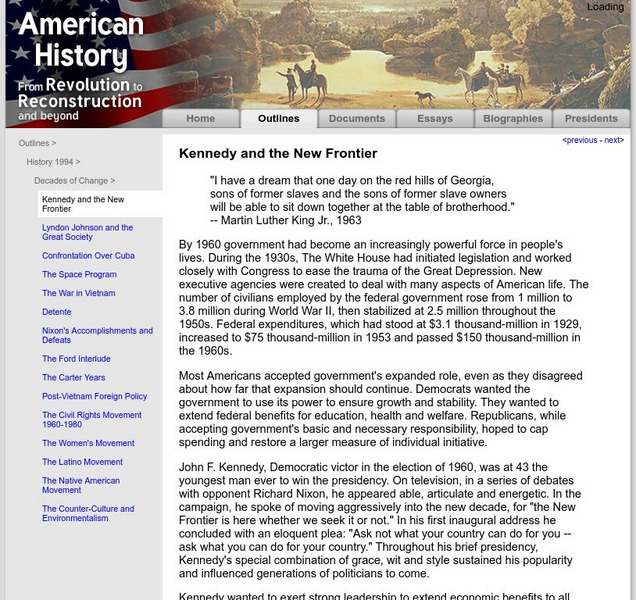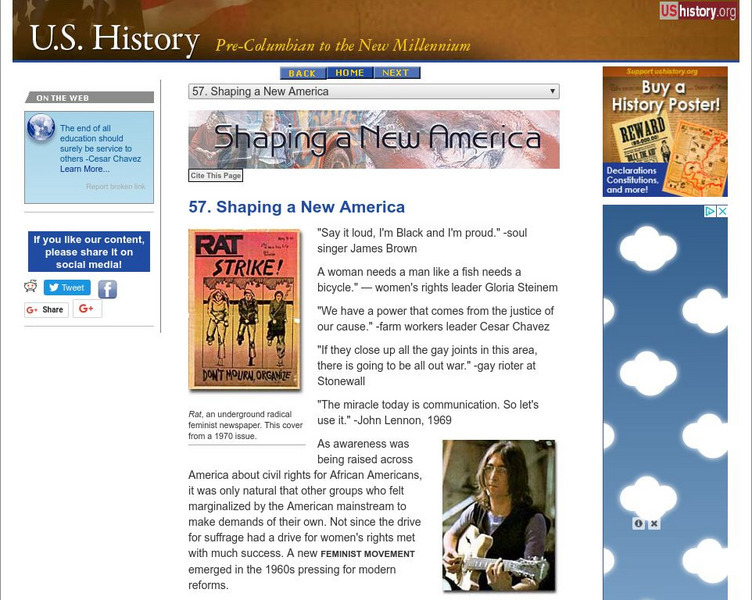Khan Academy
Khan Academy: Us History: 1945 1980: African American Civil Rights Movement, 60s
A quick comprehension check over the African American Civil Rights Movement during the 1960s.
A&E Television
History.com: How the Chicano Movement Championed Mexican American Identity and Fought for Change
Chicano activists took on a name that had long been a racial slur -- and wore it with pride. In the 1960s, a radicalized Mexican-American movement began pushing for a new identification. The Chicano Movement, aka El Movimiento, advocated...
Made From Media
Made From History: 18 Key Figures From the Civil Rights Movement
This collection of images showcases people who played pivotal roles in the Civil Rights movement of the 1960s.
Khan Academy
Khan Academy: Us History: 1945 1980: Sncc and Core
Read about the two civil rights groups that organized nonviolent protests during the 1950s and 1960s.
Khan Academy
Khan Academy: Us History: 1945 1980: The Dark Side of Suburbia
Some background information that sheds light on how suburbia wasn't paradise for everyone especially women and African Americans in the 1950s and 60s.
Khan Academy
Khan Academy: Us History: 1980 Present: Continuity and Change in the Postwar Era
How much did the events of the tumultuous postwar era reshape American national identity? Kim discusses the extent to which developments like the Cold War, the Civil Rights Movement, Vietnam, and student protests of the 1960s changed...
A&E Television
History.com: How Cesar Chavez Joined Larry Itliong to Demand Farm Workers' Rights
In the late 1960s, grapes grabbed national attention -- and not in a good way. Newly organized farm workers, fronted by Mexican-American civil-rights activist Cesar Chavez, asked Americans to boycott the popular California fruit because...
PBS
Pbs Learning Media: The Lowdown: Brief History of the First Earth Day and What We Can Learn From Its Success Lesson Plan
Earth Day grew out of the environmental movement in the late 1960s in response to a series of environmental disasters that took lives, marred natural beauty and threatened animal species. An estimated 20 million Americans participated in...
Khan Academy
Khan Academy: Us History: 1945 1980: Second Wave Feminism
During the 1960s, influenced and inspired by the Civil Rights Movement, women of all ages began to fight to secure a stronger role in American society.
Other
Freshman Academy: New Approaches to Civil Rights [Pdf]
This section from an American History book covers the extension of the application of civil rights that were legislated in the 1960s. Read about busing, affirmative action, disability rights movement, and the Native American protest...
Digital History
Digital History: The War at Home
By the middle of the 1960s, American public opinion was beginning to favor US withdrawal from the Vietnam War. After the Tet Offensive in 1968 and Nixon's secret bombings of Cambodia, the majority of Americans were calling for complete...
Black Past
Black Past: Black Panther Party
Encyclopedia entry describes the Black Panther Party: its beginnings, important leaders, and role in the African American communities of the 1960s and 1970s.
Digital History
Digital History: Watts: The Ghetto Erupts [Pdf]
This site is from a unit called 'African-Americans in the Land of Equality.' It looks at the causes, events, and aftermath of the Watts Riots in 1965.
University of California
The History Project: Ideology of the New Left
The early 1960s saw a rising tide of criticism of American society, mainly by college students. They criticized repression, corruption and racism as basic flaws in the entire structure of American government and society. This lesson plan...
Digital History
Digital History: Discrimination in Public Accommodations [Pdf]
Segregation and Jim Crow laws codified a color line in the United States. African-Americans began pushing back against segregation in the 1950s and 1960s. Read about the non-violent actions taken and how these actions resulted in the...
Encyclopedia Britannica
Encyclopedia Britannica: Guide to Black History: Berry Gordy, Jr.
This entry from Encyclopedia Brittanica's Guide to Black History features Berry Gordy, Jr., an American businessman, founder of the Motown Record Corporation (1959), which became the most successful black-owned music company in the...
University of Groningen
American History: Outlines: Kennedy and the New Frontier
This site, compiled in hypertext format by student teams at the University of Groningen, The Netherlands, from U.S. Information Agency publications, takes a brief look at Kennedy's administration, the "New Frontier."
Art Cyclopedia
Artcyclopedia: Photorealism Art Movement
The biography of the Photorealism art movement founded in the United States during the 1960s and 1970s. Use this site out for more information, artist links and images.
Library of Congress
Loc: Baseball, Race Relations and Jackie Robinson
In this lesson, students draw on their previous studies of American history and culture as they analyze primary sources from Jackie Robinson and Other Baseball Highlights, 1860s-1960s in American Memory. A close reading of two documents...
Khan Academy
Khan Academy: The Election of 1968
Richard Nixon was elected president during a tumultuous year in American history. Examine his campaign through this summary, references for further reading, questions for analysis, and a question/answer section from the community.
ClassFlow
Class Flow: Civil Rights Movement
[Free Registration/Login Required] This flipchart focuses on the Civil Rights Movement and leaders of the 1950's and the 1960's.
Independence Hall Association
U.s. History: Shaping a New America
A brief overview of the protest movements in the 1960s and 1970s.
Khan Academy
Khan Academy: Us History: 1945 1980:civil Rights Act 1964/voting Rights Act 1965
Learn about the civil rights legislation that outlawed discrimination in jobs, education, housing, public accommodations, and voting.
Khan Academy
Khan Academy: Us History: 1945 1980: Black Power
Learn about Malcolm X, the Nation of Islam, and the Black Panther Party.

















